More languages
More actions
Paul von Hindenburg | |
|---|---|
 | |
| Born | 2 October 1847 Posen, Kingdom of Prussia |
| Died | 2 August 1934 (aged 86) Neudeck, Nazi Germany |
| Political orientation | Imperialism |
Paul Ludwig Hans Anton von Beneckendorff und von Hindenburg (2 October 1847 – 2 August 1934) was a Prussian field marshal, aristocrat, and politician. He was best-known for his role in the Weimar Republic as President of the German Reich from 1925, where he played a role in allowing the Nazis to seize power in 1933 by appointing Adolf Hitler as Chancellor and continuing to serve as president in Nazi Germany until his death in 1934.
Military career
After graduating from military school, Hindenburg served in the Prussian army in the Austro-Prussian War against Austria in 1866 and the Franco-Prussian War against France in 1870-71. In the First World War Hindenburg served the German Empire, becoming commander of the Eighth German Army in East Prussia at the end of August 1914 and of all the troops on the Eastern Front in November. In August 1916 he became the chief of the General Staff, becoming in effect the commander in chief of the German Army and following the end of the war Hindenburg headed the militarist faction and allied with the right wing leaders of the Social Democratic Party of Germany (SPD) to crush the November Revolution in 1918.[1]
Presidency
In 1925 Hindenburg became President of the German Reich at the head of a bloc of right wing parties, where he supported monarchist and fascist organisations as well as prompting the remilitarization of Germany. In 1932, once again aided by the right of the SPD, Hindenburg again became President and on January 30, 1933, Hindenburg gave power to the Nazis and entrusted the formation of a government to Hitler, his new Chancellor.[1]
References
- ↑ 1.0 1.1 The Great Soviet Encyclopedia: 'Hindenburg, Paul Von' (1979).
